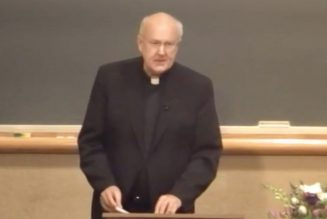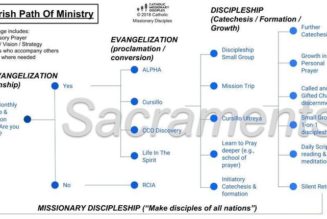
In a certain sense, the Sexual Revolution is over; at the very least, the walls have been breached and the consequences are serious and long-lasting. The Reign of “Gay” is proud, loud, and quite unwilling to tolerate dissent or discussion. And until we face that fact and come to grips with the situation as it really is, we will not be able to respond, regroup, and rebuild in any meaningful way. After all, if the kings and queens of this reign—assisted by their grim, willful lackeys—are going to denounce and shout down Andrew Sullivan, who is openly homosexual, what do you think they want to do to the Catholic Church?
That paragraph concluded an editorial I wrote ten years ago, in April 2014. Titled “Welcome to the Reign of ‘Gay,’” it drew up Robert R. Reilly’s excellent Making Gay Okay to reflect on fast-moving changes in the dominant, secular culture. However, “fast-moving” was already morphing, with dizzying velocity, into what I soon began calling “the Tyranny of Trans.” In short, the secular West had undergone a revolution that was not just sexual, but completely anthropological—and thus social, cultural, and political as well. Having made nearly every sexual act acceptable and relationship celebrated, the attention has turned to finding one’s “identity” and insisting that it be accepted and celebrated—by everyone.
But, thankfully, the Church has been a bulwark against the obsessive drive to unmoor humanity from biological fact, natural law, and reality itself. Right? Alas, the past decade has witnessed an abundance of confusion, disheartening enough, but also a push to normalize—usually in the name of pastoral sensitivity and awareness of “lived experiences”—homosexuality, queerness, and transgenderism. The velocity in some quarters has been voracious.
In a short but prescient essay published in October 2018, Dr. Michael Hanby observed:
One could hardly be blamed for wondering whether future historians and theologians will look back on this period in ecclesial history and say, with an amazement similar to St. Jerome’s: “The whole world groaned and marveled to see itself gay.” … We seem to have lost our capacity to think and speak about “LGBT identity” without capitulating to it.
That certainly appears to be even more true today. Many examples of this capitulation, not to mention overt disregard for the Church’s moral teachings and understanding of the human person, are evident in recent remarks by cardinals, bishops, priests, and lay people. Here are just a few very recent examples:
• L’Osservatore Romano, the Vatican newspaper, published a preface by Bishop Francesco Savino, written for the book Via Crucis di un ragazzo gay [Via Crucis of a Gay Boy], authored by Luigi Testa, an Italian law professor. The book is categorized by the publisher as “Theology from the peripheries.” Bishop Savino, who has been the vice president of the Italian Episcopal Conference since 2022, stated: “We have a profoundly evolving understanding of sexuality, much richer, freer and more open than was given in traditional societies. Often as an ecclesial community we run the risk of fearing rather than welcoming whatever good can emerge from the relationships between people with their own and other people’s corporeality.” Denouncing “human slowness and prejudices”—apparently aimed at those who adhere to Church teaching on sexuality—he says: “The Church is either inclusive or it is not!”
• Cardinal Robert McElroy expressed his sensitivity to evolving understandings in a February 16th address given in Anaheim at the Religious Education Congress:
It is essential to safeguard the deposit of faith. But how do the doctrinal tradition and history of the church restrict the church’s ability to refine its teaching when confronted with a world where life itself is evolving in critical ways, and it is becoming clear that on some issues the understanding of human nature and moral reality upon which previous declarations of doctrine were made were in fact limited or defective?
Then, remarking on Fiducia Supplicans (“No change in doctrine was made”) McElroy says:
It is wholly legitimate for a priest to decline to perform the blessings outlined in Fiducia because he believes that to do so would undermine the strength of marriage. But it is particularly distressing that the opposition to Fiducia in our own country focuses overwhelmingly on blessing those in same sex relationships rather than those many more men and women who are in heterosexual relationships that are not ecclesially valid. If the reason for opposing such blessings is really that this practice will blur and undermine the commitment to marriage, then the opposition should, one thinks, be focusing at least equally on blessings for heterosexual relationships. We all know why it is not: An enduring animus toward LGBT+ persons.
This echoes his statement in a January 2023 essay: “It is a demonic mystery of the human soul why so many men and women have a profound and visceral animus toward members of the LGBT communities.”
• A few days before Holy Week, this bit of news:
The Catholic Church’s “established, dogmatic models of the theological approach to sexuality have become anachronistic,” a moral theologian told a conference on sexuality and culture at the John Paul II Pontifical Institute for Marriage and Family Sciences in Rome. Developing a new theological ethics of sexuality is “a task for the entire church community,” Salesian Father Ronaldo Zacharias, a professor of moral theology at the Salesian University of São Paulo, told the conference March 21.
And, yes, he also said that “in recent decades there has been a remarkable evolution regarding terminologies, concepts and descriptions related to sexuality…” Further, referencing the Brazilian theologian Augustinian Sister Ivone Gebara—a pro-abortion, neo-Marxist—Zacharias said that the church’s “theology of binary sexuality is no longer able to understand the complexity that we discover in ourselves.”
• There was also Pope Francis’s remark in his new autobiography, about same-sex civil unions: “It is right that these people who live the gift of love can have legal coverage like everyone else.” This echoed his remark in February, responding to continued controversy over Fiducia Supplicans: “I don’t bless a ‘homosexual marriage,’ I bless two people who love each other and I also ask them to pray for me.” (In case you didn’t know, those who are bothered by such things are “hypocrites.”) And there is Cardinal Mario Grech’s poetic utterance about same-sex blessings and the divide over FS: “I always imagine the Church as a rainbow, with the colors that are not excluded but, together, create harmony. A harmony that, of course, would be missing where there was a conflict.”
• And this list isn’t complete without the ubiquitous cleric of all things “LGBTQ+”: Jim Martin, S.J. In mid-March, he touted an essay by a fellow Jesuit arguing that the story of Sodom and Gomorrah is not about homosexuality at all. The essay, not surprisingly, was posted on the “Outreach: An LGBTQ Catholic Resource” site, founded by Martin and operating “under the auspices of American Media, a Jesuit ministry.” The website routinely features articles with titles such as “LGBTQ Catholics need a queer theology of liberation” and “Why queer joy is vital to the church” and “I find God in my gay relationship. What does ‘Fiducia Supplicans’ mean for us?”
A recent post on X (formerly Twitter) by Martin provides a microcosm of an oft-used approach: to refer to and quote from an essay or book by a liberal Protestant about how this or that passage in Scripture (usually Romans 1) really isn’t about homosexuality as we think about it. So, from late January:
As I pointed out, the remarks by Brandan Robertson—a former Baptist who is now a “LGBTQ activist” and pastor of Sunnyside Reformed Church in Queens, New York—are “shallow and embarrassing.” I noted that the “great Jesuit Scripture scholar Joseph A. Fitzmyer, in his detailed commentary on Romans … flatly and rightly rejects this sophistic nonsense.”
In other words, the Jesuit priest who has the ear of Pope Francis on matters “LGBTQetc” touts the shallow blather of a man dedicated to “queering Christianity” but ignores an exceptional Jesuit Scripture scholar who wrote: “Paul sees homosexual conduct as a symbol of the perversions stemming from idolatry…” But, as LaCroix International stated in a recent puff piece, Martin “is one of the leading advocates for including LGBT people within the Catholic Church. He has both the trust and ear of Francis.”
Again, these are just a few examples from recent months. With that in mind, here are some observations.
The “LGBTQetc” movement (which is not a “community,” but a political construct) and its allies rely on a combination of falsehoods, emotivism, abuse of language, and alleged victimhood to pursue its goals. Cardinal McElroy’s claim of an “enduring animus toward LGBT+ persons” is a good example. It makes a specious generalization using loaded and emotional language, while relying on descriptives that have no root in reality.
To accept terms such as “lesbian,” “gay,” “bisexual,” “transgender,” or “queer” is to, first, accept that attractions and inclinations form one’s identity rather than indicate weaknesses and passions that must be addressed and mastered. Since a man cannot be a woman, or a woman be a man, the category of “transgendered” is entirely subjective and contrary to biology, commonsense, and natural law. McElroy’s use of the bigoted card is, however, certainly effective; the vast majority of people, including Catholics, want to avoid being portrayed as “homophobic” (another misleading term) or “hateful.” But fear and sentimentality are powerful forces; they play a significant but too often ignored role in the new and powerful der lange Marsch durch die Institutionen.
This new “long march” also builds upon the many capitulations and failings in the West when it comes to contraceptives, abortion, cohabitation, fornication, adultery, pornography, masturbation, and so forth. It takes advantage of Catholics who are either complicit or cannot see what has transpired and is transpiring now. Deflections, false dichotomies, and misrepresentations appear. Pope Francis, in August 2023, lamented to a group of Portuguese Jesuits about certain “very strong, reactionary” American Catholics (which he deemed “backwardists”), saying: “What I don’t like at all, in general, is that we look at the so-called ‘sin of the flesh’ with a magnifying glass. If you exploited workers, if you lied or cheated, it didn’t matter, and instead relevant were the sins below the waist.”
Ironically, many workers, foster families, and others in the United States are faced with pressures and demands that flow directly from “below the waist” obsessions from those openly attacking traditional beliefs about sexual morality. Furthermore, it’s nearly impossible to find any American whose life has not been directly affected by the sexual revolution and the “LGBTQetc” cultural blitzkrieg.
Most importantly, sexual sins are not trivial, but deeply damaging, leading to a vast range of ill effects, damaging or destroying lives, and undermining social order. (Besides, one can be against two sins at one time; it’s not impossible by any means.) “Shun immorality,” wrote Saint Paul to the Corinthians, who were living in a sexual cesspool of a society, “Every other sin which a man commits is outside the body; but the immoral man sins against his own body” (1 Cor 6:18). Yes, by all mean, let’s have fair labor practices, but let’s not labor under the shallow notion that mis-using and abusing our very bodies, which are temples of the Holy Spirit, is of no immediate or everlasting consequence.
As Persona Humana—a document worth reading from start to finish—noted nearly 50 years ago:
The Church cannot remain indifferent to this confusion of minds and relaxation of morals. It is a question, in fact, of a matter which is of the utmost importance both for the personal lives of Christians and for the social life of our time.
Finally, the appeal to “a profoundly evolving understanding of sexuality” is so obviously facile and self-serving as to be ludicrous—which it surely is. It reminds me of certain Christian guys from my college years who tried, with hormone-impaired clumsiness, to justify sleeping with their girlfriends. Such claims are thoroughly scientistic, purposefully dismissing Scripture, Tradition, natural law, commonsense, and, yes, science in thinly veiled attempts to subject the Church to sexual nominalism. The Church is an “expert in humanity,” but far too many Catholics today think that their “lived experience” should usher in an age of “queer Catholicism” and anthropological madness.
As one scholar, a longtime observer of Church comings-and-goings wrote to me recently:
Where is the hard evidence that there is something new that somehow changes our understanding of the morality of the sexual act? These men constantly invoke this stuff and then appeal to psychology and sociology which, with some minor exception, are among the junkiest intellectual disciplines in our time because they are so driven by ideology.
What do we need now? We must, of course, adhere to what the Church teaches about sexuality, and consider more deeply, as St. John Paul II did so well, what it means to be man and woman in this world. And, having recently read Bishop Erik Varden’s exceptional Chastity: Reconciliation of the Senses (Bloomsbury, 2024; read an excerpt), I’m more convinced than ever that we need a recovery of what it means to be chaste—which is routinely ignored or described as of little importance.
But taking chastity seriously requires a belief that communion with God, life in Christ, and holiness are more important than our desires, our inner turmoils, and our existential crises—and, in fact, that they fulfill those desires, calm those turmoils, and solve our crises. In short, the answer to the Reign of Gay and Tyranny of Trans is to accept and embrace the Kingdom of Christ in our hearts and minds, and
by the mercies of God, to present your bodies as a living sacrifice, holy and acceptable to God, which is your spiritual worship. Do not be conformed to this world but be transformed by the renewal of your mind, that you may prove what is the will of God, what is good and acceptable and perfect. (Rom 12:1–2)
Carl E. Olson is editor of Catholic World Report and Ignatius Insight. He is the author of Did Jesus Really Rise from the Dead?, Will Catholics Be “Left Behind”?, co-editor/contributor to Called To Be the Children of God, and author of the “Catholicism” and “Priest Prophet King” Study Guides for Bishop Robert Barron’s Word on Fire. His recent books on Lent and Advent—Praying the Our Father in Lent and Prepare the Way of the Lord—are published by Catholic Truth Society. Follow him on Twitter @carleolson.









